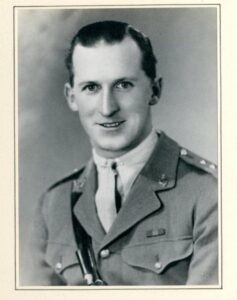Lt Eddie McDonnell was the son of Lieutenant Colonel John McDonnell (killed in action September 1918) and Senta McDonnell (daughter of Robert Darcy Jameson of Kilsharvan, County Meath, Ireland).

He came to Winchester as a War Exhibitioner and proved a keen sportsman. He was a fine gymnast and won the Gold Medal in 1933.
As a sergeant in the OTC, he helped his House to win Bather Cup in the same year. He was also a good hurdler and a keen rider.
He went to RMC Sandhurst in 1933 as a Prize Cadet and became an Under-Officer. Commissioned in 1935 into the 8th King’s (Royal Irish) Hussars, he then served in Palestine, gaining promotion to Lieutenant in 1938.
A correspondent in The Times wrote of him as follows:
“Eddie McDonnell was given much: brains, exuberant spirits, and perfect health… He joined the 8th Hussars and entered wholeheartedly into all the varied phases of regimental life. A good and extremely keen soldier, he tackled every duty, however trivial, with amazing zest and conscientiousness. Rich are our memories of Eddie in the field of the sport before the war – saddling up some woolly youngster at Punchestown; hurdle racing in Cairo; that weird and wonderful polo back-hander. His happy home life in Ireland, with the regiment and all that it stood for, were the things most dear to him.”
He saw active service in North Africa from 1939 and was attached to the headquarters of the 7th Armoured Division, the famous ‘Desert Rats’ he was present during the successful campaign in Cyrenaica (Libya) of early 1941, under the command of a Wykehamist, General Archibald Wavell.
As Sir Winston Churchill put it: “… in two months the Army of the Nile had advanced five hundred miles, had destroyed the Italian Army of more than nine divisions and had captured 130,000 prisoners, four hundred tanks and 1290 guns.”
The climactic battle of the Cyrenaica campaign was that of Beda Fomm, February 5th-6th 1941. An officer in 3rd Hussars, Lieutenant Roy Farran, wrote of Beda Fomm that:
“For ten miles as far as the eye could see there was a mass of abandoned lorries and tanks. The enemy panicked in the night after his vehicles got stuck in soft sand while attempting to wriggle past us down the coast road. Leaving their lorries, guns and tanks, almost all undamaged, they had bolted down to the beaches. It was a glorious victory. The Italian Army of Cyrenaica was completely smashed.”
After this stunning victory, advance elements of the 7th Armoured Division pressed onwards southwest towards Tripoli and Tunisia. On February 11th (the regimental history states February 7th), McDonnell was severely wounded in a bombing attack on the headquarters of the 7th Armoured Division in Benghazi, struck in the legs by a blast from an aerial mine.
McDonnell died in Benghazi on February 16th at the age of twenty-five.
A short time before his death, whilst serving on the Staff, McDonnell wrote:
“I’m learning a lot here which will be useful if this line of country is to continue, although I hope it won’t, as I want to go back now and do my ordinary job in the regiment while this show is on.”
He rests in grave 7.D.30 of the Benghazi War Cemetery, on which is inscribed: “Tout Jour Pret”.


